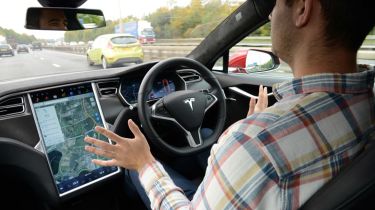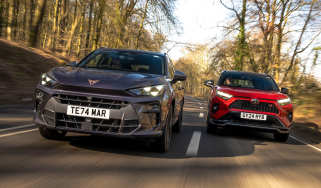‘Boring’ self-driving cars create distracted drivers unsafe to take back control
New study by University of Nottingham sees drivers more interested in their phones than the road when behind the wheel of a car with autonomous systems

Self-driving cars may be at the bleeding edge of today’s technology, but a new study has found that travelling in one can be summed up in one word: boring.
Yes, that’s right; an investigation by the University of Nottingham analysed the behaviour of 17 motorists – each accompanied by one passenger – when behind the wheel of a driving simulator, designed to replicate an SAE Level 3 autonomous vehicle. It found that the lack of stimulation for the driver, derived from not providing as many control inputs, resulted in a lack of attention and interest.
For those unaware, the Society of Automotive Engineers (SAE) compiled a series of levels to describe autonomous car technology. Under this scale, an SAE Level 3 autonomous vehicle is described as ‘conditionally’ automated. What does that mean? Well, it means that in situations like traffic jams and when cruising on the motorway, the car can take full control, with little to no input from the driver. However, the driver is required to be available to take back control when the need arises.
During the experiment, participants spent most of their hands-off time chatting to the passenger, scrolling on their phones and watching videos, with one participant even playing online chess.
However, such a lack of attention during this period harmed each participant’s driving performance when the simulated car requested driver intervention. Researchers commented how “vehicular control during the ten seconds immediately after resuming manual driving was generally poor in the case of all participants”. This saw drivers accelerating and braking harshly, as well as “wavering in their lanes”.
In fact, some participants got so heavily distracted during the experiment that they ended up missing several turnings and directions on the pre-designated route. However, it was observed that passengers were keen to encourage the driver to pay attention to the road, telling researchers that they were “acutely aware of the potential distraction they posed to the driver, recognising that the driver was ultimately in control of the vehicle”.
The study was funded by the RAC Foundation, with director Steve Gooding calling for automotive engineers to “develop systems that recognise how people, with all their foibles and fallibilities, are likely to react in the real world with all its distractions”.
“The irony is that whilst fully self-driving cars aim to do away with human input, semi-autonomous vehicles will still demand that people have some control,” he continued. “Unfortunately, this study show[s] that the handover process between human and machine is less than smooth and far from quick, raising serious questions as to whether this sort of intermediate technology will ever become commonplace, let alone safe.”
University of Nottingham Professor and Senior Research Fellow, David R Large, observed that while passengers are typically deemed as ‘distracting’ in manually-driven cars, “[the] study highlighted the distraction that passengers continue to pose inside these vehicles, but also the value they can offer”.
“We observed passengers providing help and assistance to drivers during manual takeovers of the vehicles, and sharing the responsibility of keeping the focus on the road when needed.”
Even with the technology available to us today, it remains a while before we can expect to see fully autonomous machines populating our streets. In May, the outgoing Conservative administration’s Autonomous Vehicles Act reached Royal Assent, paving the way for driverless cars on UK roads as soon as 2026.
One of the stipulations in the new set of laws places legal culpability in the case of an accident firmly on the automotive manufacturer, with the driver instead being deemed as a ‘user-in-charge’ whenever fully autonomous settings are active.
Have your say on the prospect of driverless cars on UK roads in the comments section...
Find a car with the experts





